Key takeaways:
- Acceptance by a recognized educational institution is crucial for a student visa application, along with detailed financial evidence.
- Researching your study destination, including cultural norms, cost of living, and support services, facilitates smoother transition and adjustment.
- Thorough document preparation, including translations and personal statements, enhances the chances of visa approval.
- Effective interview strategies, such as practicing common questions and being aware of body language, help create a positive impression on visa officers.
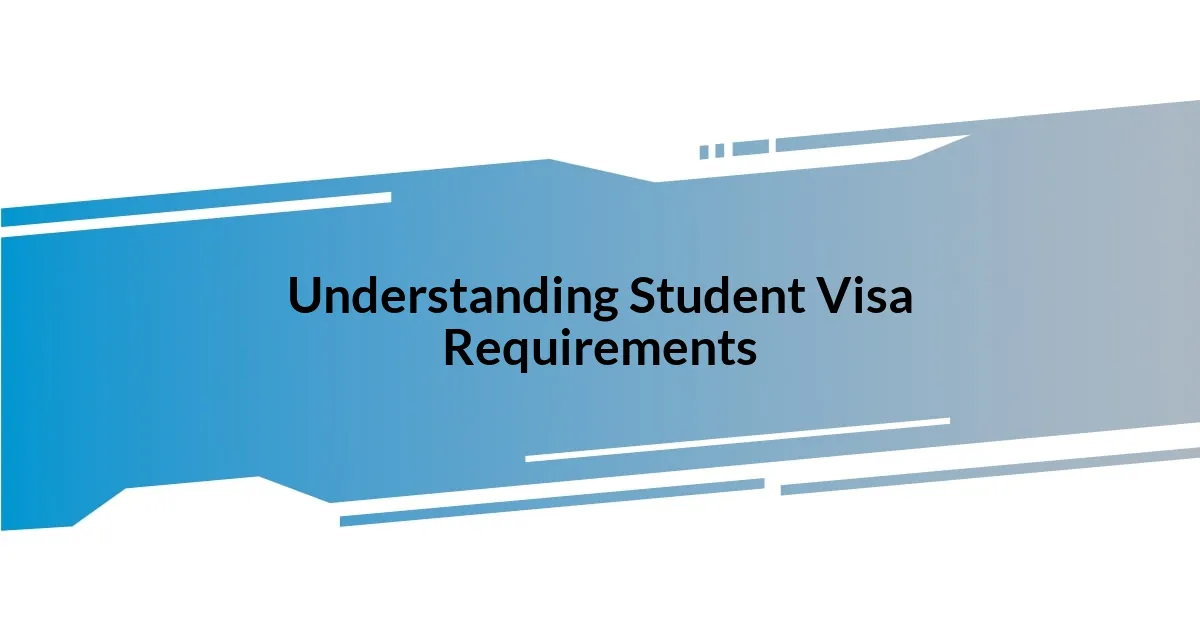
Understanding Student Visa Requirements
Understanding the requirements for a student visa can feel like navigating a maze. I remember when I was applying, the sheer volume of documents made my head spin. Have you ever felt overwhelmed by paperwork? It’s easy to get lost in the fine print and miss crucial details.
First and foremost, you’ll need to prove you have been accepted by a recognized educational institution. It’s not just about getting the acceptance letter; you should also ensure it details your course length and level of study. When I received my acceptance letter, I remember the mix of excitement and anxiety as I realized just how important that piece of paper was for my visa application.
Additionally, financial evidence is often required to demonstrate that you can support yourself during your studies. This part is more than just numbers; it shows you’re committed to your education and living abroad. Reflecting on my experience, I found that creating a detailed budget helped me feel more in control of my situation—and having that information ready made my application feel much easier.
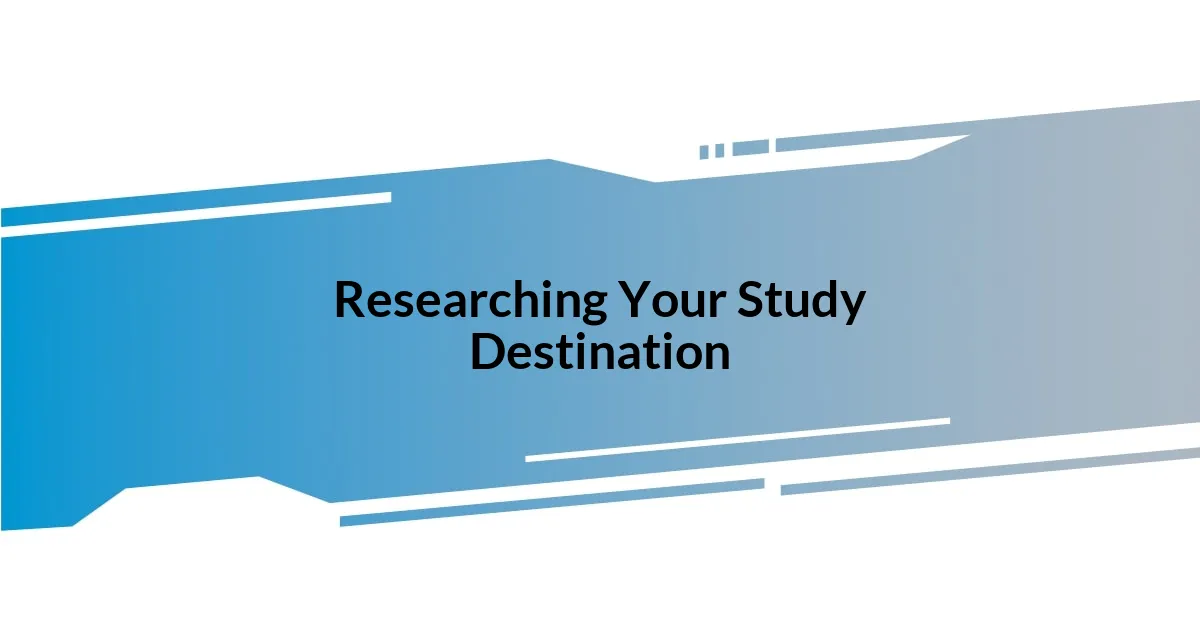
Researching Your Study Destination
Before you pack your bags, spending time researching your chosen study destination is crucial. I remember feeling a mix of excitement and apprehension when exploring unfamiliar places online. Knowing the culture, language, and lifestyle can significantly impact your adjustment once you arrive. It’s not just about the academics; it’s about the whole experience. I once overlooked local customs, which made my initial weeks a bit awkward until I got the hang of things.
Here are some key factors to explore during your research:
- Cultural Norms: Understanding the local customs and traditions can help you fit in and avoid misunderstandings.
- Cost of Living: It’s essential to have a clear idea of how much you’ll need for accommodation, food, and personal expenses.
- Transport Options: Familiarize yourself with public transport systems to ease your daily commute.
- Weather Conditions: Knowing what to expect weather-wise will help you prepare your wardrobe accordingly.
- Support Services: Look into what resources your institution offers for international students, from orientation programs to counseling.
I remember feeling much more confident when I had this information mapped out before my arrival. It made the transition smoother and less daunting.
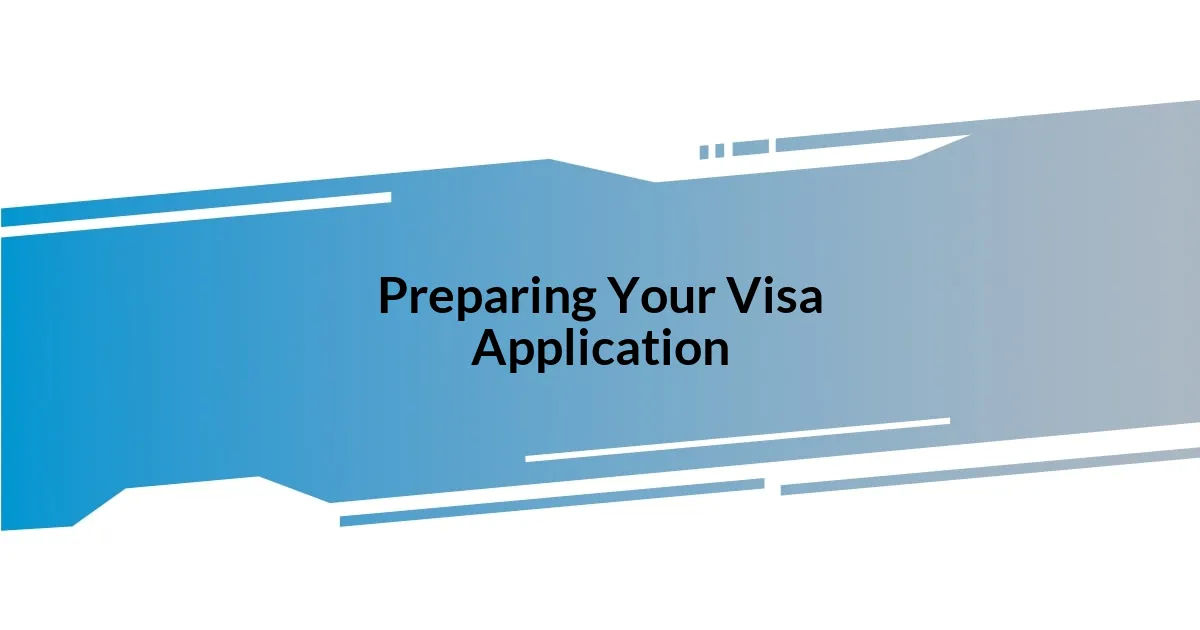
Preparing Your Visa Application
The heart of your student visa application lies in the preparation of documents, and trust me—organization is key. When I started gathering materials, I created a checklist to keep everything in order. This simple strategy not only reduced my stress but also helped me avoid the frantic last-minute searches for essential documents. Have you ever misplaced something important right before a deadline? It’s a feeling of dread I wouldn’t wish on anyone.
In particular, focus on your academic records, like transcripts, and make sure they’re translated if necessary. I learned this the hard way when I submitted my documents only to find out a translation was needed. Fortunately, I caught it in time, and it ended up being a valuable lesson in thoroughness.
Finally, don’t underestimate the power of a well-crafted personal statement. Sharing your motivations for studying abroad can make a world of difference in your application. When I wrote mine, I poured my heart into it—reflecting on my dreams and aspirations. That emotional touch might just resonate with the visa officers and set you apart from others.
| Document | Tip |
|---|---|
| Acceptance Letter | Verify it includes course details. |
| Financial Evidence | Prepare a comprehensive budget. |
| Academic Records | Ensure translations are complete if needed. |
| Personal Statement | Infuse it with your motivations and aspirations. |
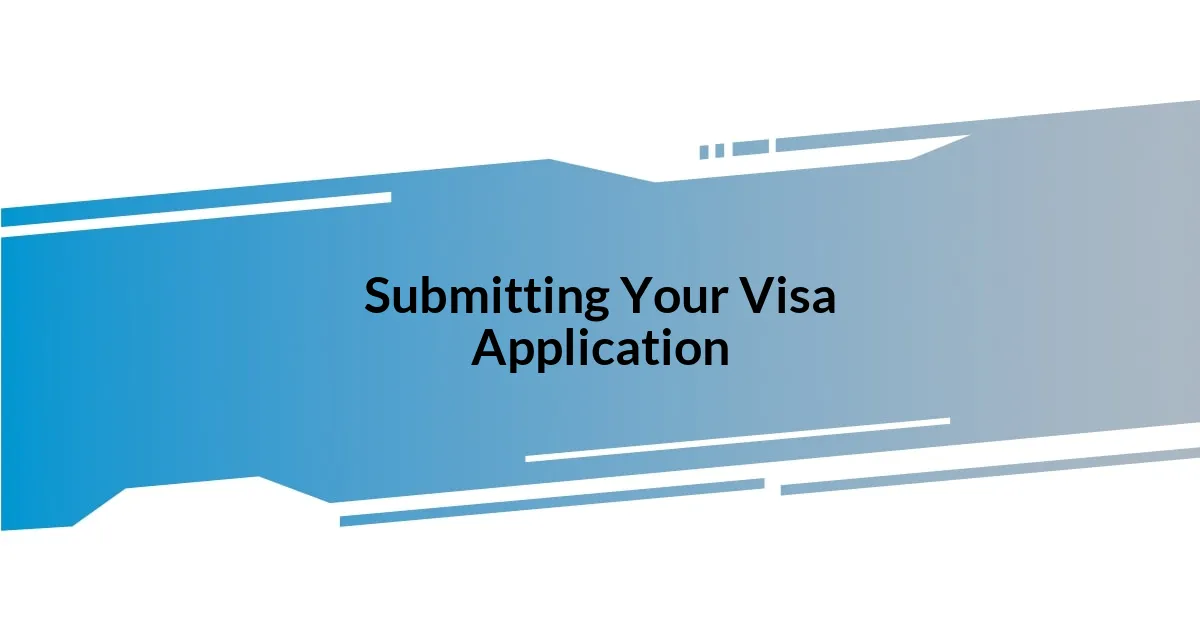
Submitting Your Visa Application
Submitting your visa application can feel like a monumental task, but breaking it down makes it manageable. I remember the nerves of clicking that “submit” button; it felt like sending a piece of my dreams out into the world. Ensuring every document was perfect brought a sense of accomplishment. Have you ever held your breath, hoping everything would go smoothly? I have, and that anxious excitement reminded me just how important this step is.
As I scrutinized my application, I often thought about the little details. One particular moment stands out: I nearly overlooked the necessary visa fee payment receipt. Luckily, a friend reminded me, and I realized how crucial it was to double-check each item. That experience taught me that thoroughness breeds confidence, and leaving no stone unturned in your application can save you from unwanted stress later.
Finally, I can’t stress enough the importance of timing when submitting your visa application. The waiting period can feel endless. Trust me, I learned it the hard way when I submitted my application a day late and had to defer my plans. You’ll want to give yourself plenty of time to address any potential hiccups. So, how can you ensure you submit on time? Start early, stay organized, and remember: patience is part of the process.
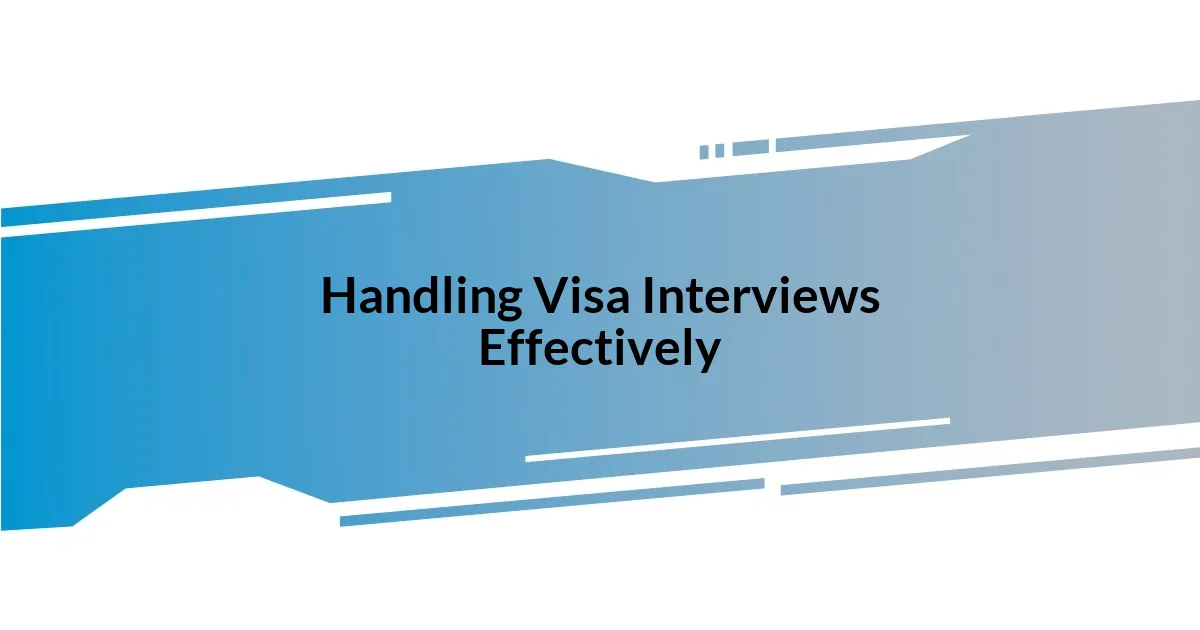
Handling Visa Interviews Effectively
Handling visa interviews effectively requires preparation and a calm mindset. I remember approaching my own interview with a mix of excitement and nervousness. To keep my composure, I practiced common questions with a friend who had been through the process before. Have you ever felt your heart race when waiting for an important moment? That’s exactly how I felt, but rehearsing helped me speak clearly and confidently during my actual interview.
When you step into the interview room, it’s essential to project confidence. I learned the sharp difference it makes when you maintain eye contact and smile genuinely. I often remind myself that the visa officers are not there to intimidate you; they’re assessing if you’re a suitable candidate. Reflection can be powerful—ask yourself, what do you want them to understand about your aspirations? Sharing your passion can create a connection and significantly influence their perceptions.
Lastly, never underestimate the impact of your body language. I recall my interview when I caught myself fidgeting; it made me feel insecure. So, I worked on displaying calm gestures and firm posture. How do you present yourself matters. By being conscious of these small details, I not only felt more secure but also communicated my commitment more effectively. Remember, the interview is as much about assessment as it is about making a personal connection—showing your genuine self can be incredibly persuasive.
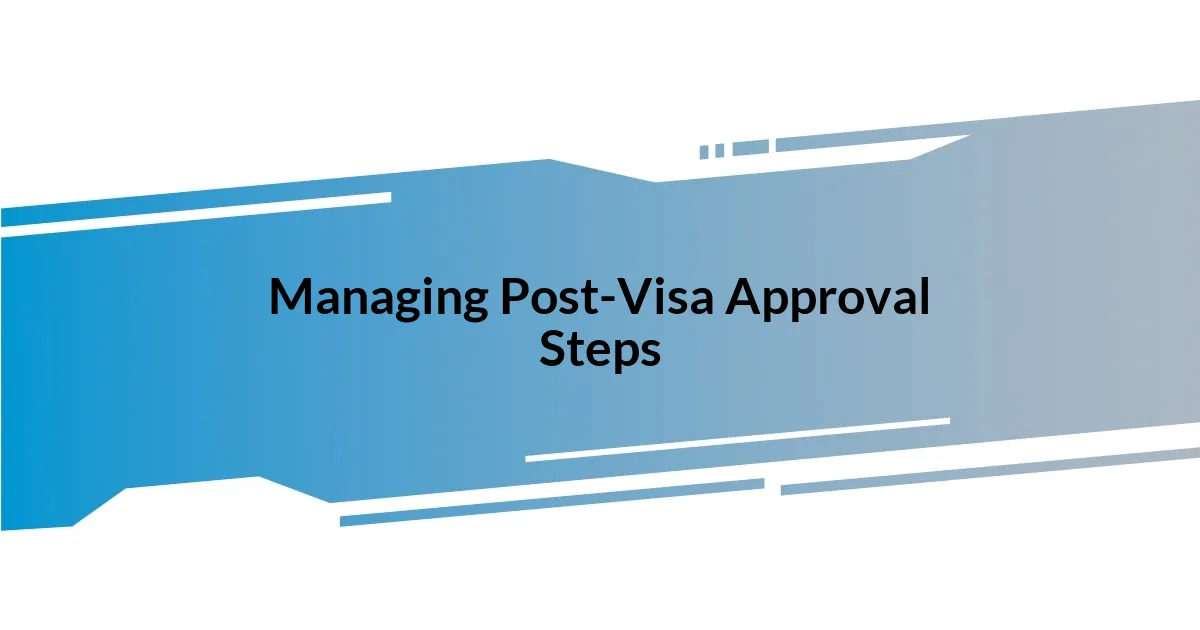
Managing Post-Visa Approval Steps
Once you receive the approval for your student visa, it’s easy to feel a wave of relief wash over you. I distinctly remember the exhilaration of that email drop into my inbox—it felt like receiving a golden ticket. However, the journey doesn’t end there. It’s crucial to act promptly on the next steps, like confirming your enrollment with your chosen institution. Have you thought about how overwhelming it can be to juggle multiple tasks right after this big win? I have, and I found making a checklist helped me systematically tackle everything without feeling lost.
Travel arrangements are another key area to focus on after your visa approval. I vividly recall booking my flight tickets at an uncertain moment—prices were fluctuating dramatically! I learned to research and compare options thoroughly, and keeping an eye on trends allowed me to snag a decent deal. What strategies can you employ to keep your travel budget in check? Setting up fare alerts or being flexible with your departure dates can make a significant difference.
Lastly, don’t forget to immerse yourself in pre-departure preparations, such as securing accommodation and understanding essential health coverage. The emotional journey can feel dual-edged—excitement mingled with apprehension. I fondly remember researching neighborhoods and imagined what it would be like to step into my new life. How do you envision your first week in a new country? Visualizing these experiences helped quell my worries and fueled my anticipation. Taking these steps confidently sets the tone for your entire adventure ahead!
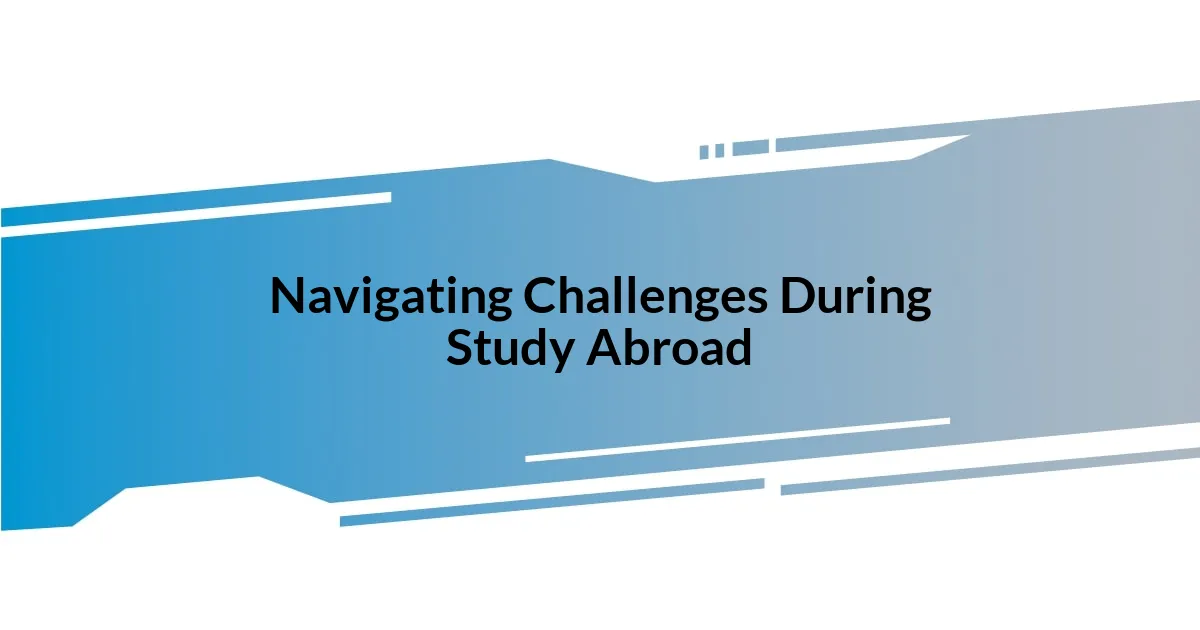
Navigating Challenges During Study Abroad
Navigating the myriad challenges during your study abroad experience can feel like walking through a maze. I still remember how daunting it was for me when I first arrived; everything was so unfamiliar. I frequently asked myself, “How do I even begin to fit in?” Over time, I learned that immersing myself in the local culture made a world of difference. Joining clubs or community groups not only helped me make friends but also eased my feelings of homesickness.
Adjusting to a new academic system can also be a hurdle. I vividly recall the initial confusion I felt regarding the grading system. It was a shift, and I found it overwhelming at times. Have you ever felt misplaced in a class where the expectations were totally different? Seeking help from professors and peers became a lifeline for me. I discovered that asking questions wasn’t a sign of weakness but rather an essential part of learning.
Language barriers, too, can be a significant challenge. I’ve had moments where I struggled to understand local accents, leaving me frustrated and lost. But I found that embracing these moments led to unexpected connections. Have you ever miscommunicated and then shared a laugh about it? I remember one instance where a simple misunderstanding turned into a delightful conversation with a local. These experiences taught me that vulnerability can often open doors and foster surprising friendships.